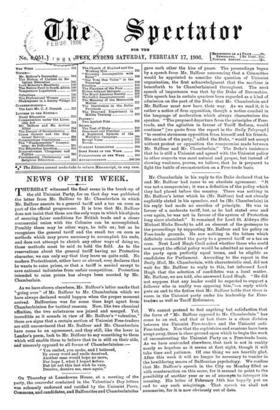Mr. Chamberlain in his reply to the Duke declared that
be and, Mr. Balfour had come to an absolute agreement. "It was not a compromise ; it was a definition of the policy which they had placed before the country. There was nothing in Mr. Balfour's letter which he (Mr. Balfour) had not already explicitly stated in his speeches, and he (Mr. Chamberlain) in his reply had made no sacrifice of principle. He was in favour of a moderate tariff, but, as he had stated over and over again, be was not in favour of the system of Protection long since abolished." It remained for Lord St. Aldwyn (Sir Michael Hicks Beach) to add an element of the grotesque to the proceedings by supporting Mr. Balfour and his policy on Free-trade grounds. He saw nothing in the letters which definitely committed the party to a general tariff or a fax on corn. Next Lord Hugh Cecil asked whether those who could not accept the official policy would be admitted as members of the party upon perfectly equal terms, and be eligible as candidates for Parliament. According to the report in the Daily Mail, Mr. Chamberlain, with characteristic zeal, did not wait for Mr. Balfour to reply to this, but informed Lord Hugh that the selection of candidates was a local matter. Mr. Balfour, we are told, also answered Lord Hugh. "He did not suppose that any leader could be expected to support a follower who in reality was opposing him,"—a reply which puts an end to the fiction that Mr. Balfour holds that there is room in the Unionist party under his leadership for Free- traders as well as Tariff Reformers.










































